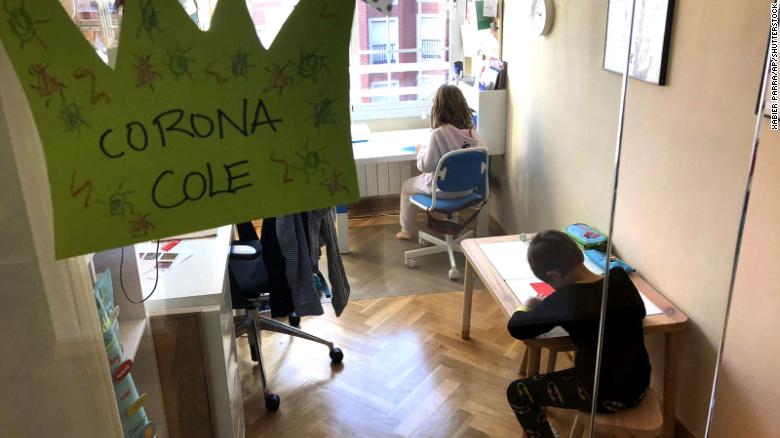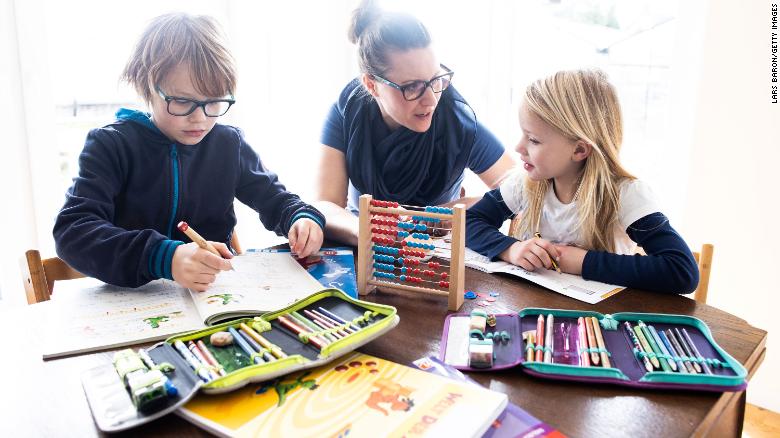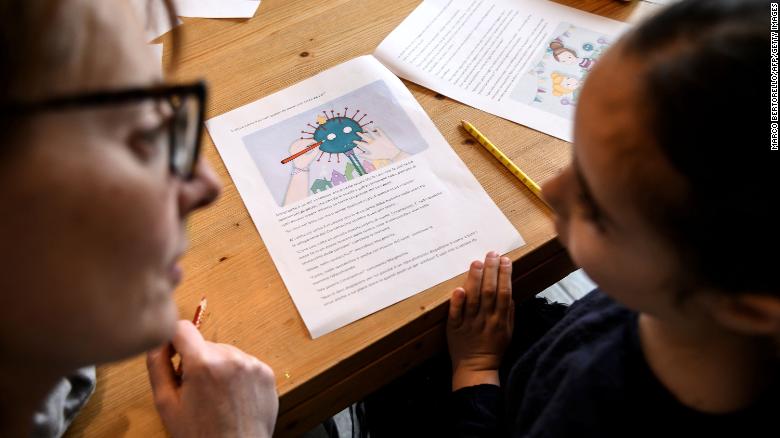(CNN)School closures due to the COVID-19 outbreak mean millions of parents and guardians who have grown accustomed to sending their children to traditional schools are now faced with the task of educating them at home.
The coronavirus has turned caregivers around the world into homeschoolers.
This transition is daunting. It's unfamiliar. And it's also critically important to ameliorate the disruptions the virus has caused in education for the year.
CNN spoke with several parents, teachers and homeschooling experts about how to make the most of homeschooling for your family.
Recognize homeschool is not school
The most important caveat about temporary homeschooling is that it simply isn't school. Kids accustomed to the school environment won't be as focused. Lessons won't be as professional as the ones they're used to getting. And since local governments are encouraging everyone to minimize interactions with others, socialization will be tough.
Kimberly Fox, staff developer for The Reading and Writing Project at Columbia University in New York, said it's important for parents to suspend disbelief and doubt and lean into the new format.
"We don't have to be school," said Fox, who lives in Brooklyn. "Under these circumstances, we're not going to entirely replace all of the structures that happen at school. But we can do a couple of things to make kids feel more secure an


Adriana, 7, and Marcos, 5, do their schoolwork at home in Madrid, Spain.
Let kids be a part of the decision-making
Many schools and school districts have set up online learning platforms or sent kids home with packets of schoolwork to complete. These assignments are non-negotiable. Beyond these requirements, however, parents can give their children a say in what else they'll learn.
Jamie Heston, a board member of the Homeschool Association of California, said the best way to do this is to have your kids make a list of things they'd like to do and learn. From there, she said, you can whittle down the options as a family.
"There are lots of ways you can have fun and have it be educational, [and] not just be sitting at a table with a book open," said Heston, who lives in Hayward, California.
Possibilities include math and chemistry through baking; botany through gardening; basic carpentry; or learning about space through a mobile app.
Make a schedule
Once you and your children have identified the subjects they will study, make a schedule and display it prominently so everyone in the family knows what's coming and when it's over. Most kids work off a schedule in their classrooms, so recreating something similar at home can ease the transition to a different learning environment for the foreseeable future.
At the same time, said Jen Reyneri, who has homeschooled two sons (ages 16 and 12), each family should embrace the opportunity to create a rhythm of life that works for them.
"Include chores, family dinners or breakfasts, and family projects in your new family routines," said Reyneri, who runs a blog and co-owns an Italian restaurant in Hobe Sound, Florida. "Because this is such a unique situation, it's also OK to let everyone sleep in a bit later."
Other options for a schedule might include basics such as math, writing, reading and music (to name a few). Some families might also set aside time for educational games accessed by computer or mobile device.
For parents who are planning to cultivate a more project-based learning environment — rebuilding a car engine, for instance — put that on the schedule, too.

Acknowledge that kids have different needs
Schools — particularly public schools — are equipped to teach a variety of children with different learning abilities and different needs. For children with special needs, districts are required by state law to devise individualized education plans (IEPs) to help kids succeed. While parents are an important part of developing these plans, they are generally not the ones who administer them. But in a homeschool environment, parents must run the show.
This can get particularly complicated in families with multiple children. Monica Smith, who lives in Healdsburg, California, has twin 7-year-old boys and said one was recently diagnosed with ADHD. Smith said her district just completed an IEP for this child, and she admitted she is anxious about how she'll be able to manage his special needs while also being there for her neurotypical child.
"Without the help of [school] resources, I'm nervous about how to best meet his needs and keep him engaged," she said of her special-needs child. "I also need to be conscious of what his twin brother needs, and make sure he doesn't feel 'ignored' just because he has the ability to work independently."
One way to address this conundrum is to remember that different kids have different needs, whether at home or at school.
"Nobody knows your kids better than you do," said J. Allen Weston, executive director of the National Home School Association in Denver. "It's OK to take the time to give [each of them] what they need."





